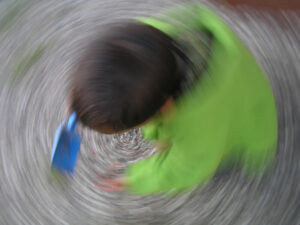Dizziness is a common medical complaint prevalent in 15-30% 1, 2 of the general population. However, it is a non-specific symptom which can refer to light headedness, imbalance, true vertigo or syncope (partial of full loss of consciousness). It can be a symptom of several diseases ranging from minor circulatory problems such as blood pressure fluctuations, inner ear balance problems to more serious nervous system disorders. Unlike dizziness, true vertigo is the sensation of spinning around. This can be migraine related, benign positional paroxysmal vertigo and Meniere’s disease. Treatment for dizziness and vertigo varies but commonly includes anti-emetics and benzodiazepines, and specifically for vertigo the ‘Epley manuever’ can be useful. In unresponsive or resistant cases longer term and use of stronger medicines increases the threat of unwanted side-effects. 
Acupuncture is an ancient form of Chinese medicine that has been used to successfully treat many diseases for over thousands of years. Research3 on sixty emergency patients who presented with dizziness or vertigo divided into two groups; one received acupuncture and the other control. Results showed significant improvements in their overall discomfort, dizziness and vertigo symptoms and lowered heart rate.
How Does Acupuncture Treat Dizziness?
Acupuncture is known to work locally at the point of needle insertion as well as stimulate the nervous system causing the release of neurochemical messenger molecules. It increases the release of endorphins and neuropeptides, thus triggers biochemical changes which works on body’s homeostatic mechanisms to boost emotional and physical health4. These anti-inflammatory and stress reducing mechanisms alleviate factors responsible for causing dizziness, including nervous tension. In uncomplicated cases a 100% recovery is possible. In the case of low blood pressure, acupuncture improves the body’s ability to regulate the blood pressure, and the ability to handle anxiety and stress more effectively.
In the case of vertigo due to Meniere’s disease5 immunomodulatory and vascular elements acts as anti-inflammatory and modulate any related infection, as a result alleviating symptoms. Similarly, in migraine related vertigo changes the way pain is processed in the brain and spinal cord thus reducing the migraine frequency. According to a Cochrane6 review of 22 trails the effectiveness of acupuncture treatment for migraines could be as good as prophylactic drugs.
You can live without Dizziness or Vertigo
The dreadful feeling of recurring dizziness or spinning is a handicap to normal life. In many cases sufferers are unable to continue to work, or struggle to care for their family and themselves. Where medical treatment is ineffective, people start to believe that they have to live with it, but this is not the case.
Chinese medicine is based on healthy flow of Qi throughout the body. Qi is the body’s vital energy that flows in pathways known as meridians or channels. From this perspective the cause of dizziness or vertigo is a condition of either a Deficiency or Excess. In the case of Deficiency, there is not enough Kidney Qi reaching the head, whilst a condition of Excess is an accumulation of Phlegm and other pathogenic elements that cause stagnation, preventing the body’s warming Qi from reaching the head. Acupuncture treatment aims to strengthen the body function to remove the Deficiency, or clear any Excess so that Qi can flow freely. Consequently, re-balancing and maximizing the body function.
Acupuncture has the advantage of being a safe treatment option without the risk of side effects or taking additional medication. It focuses on normalizing the body functions by stimulating the body’s parasympathetic nervous system lowering stress, reinstating body homeostasis and promoting healthy blood flow particularly in the head.
